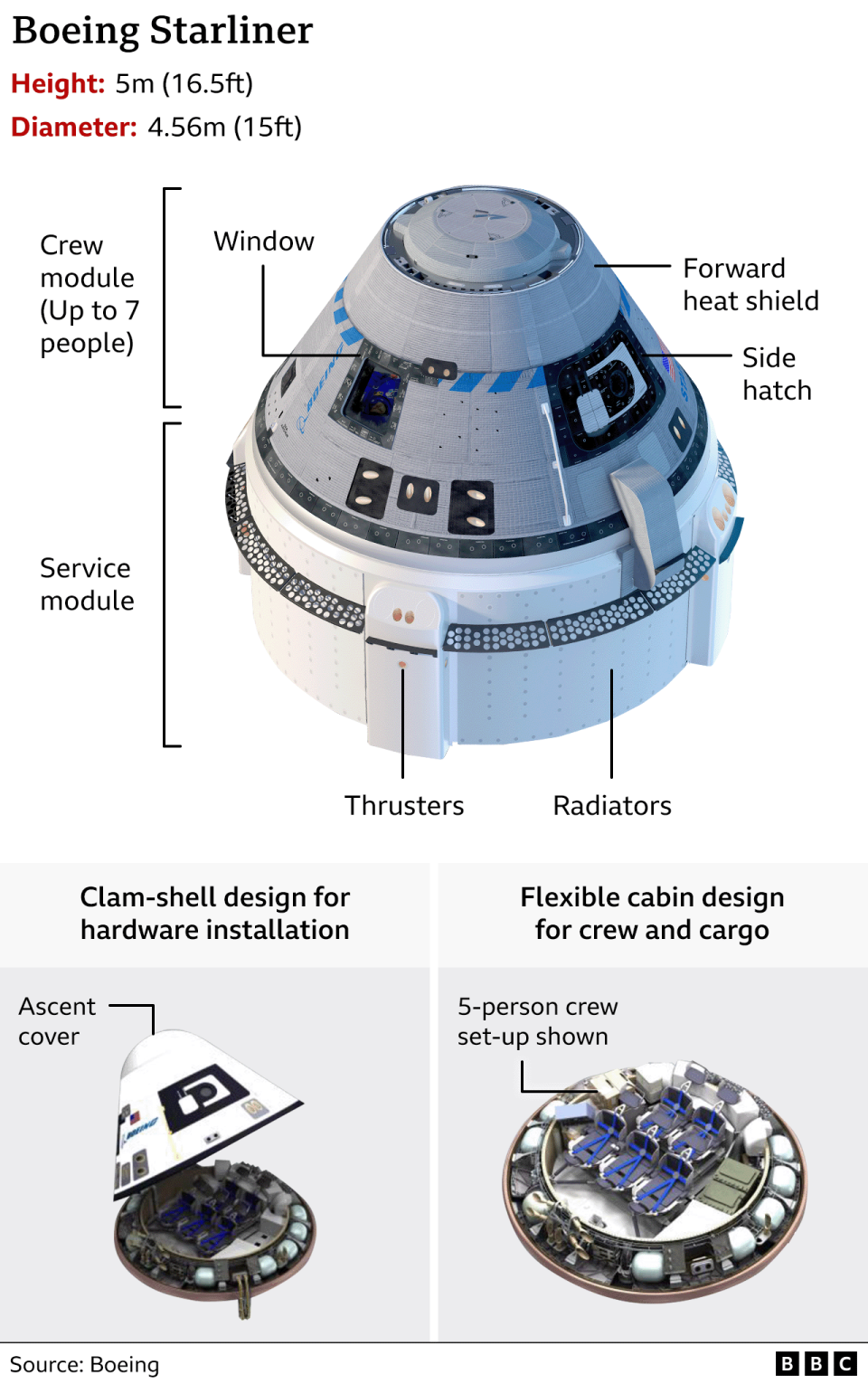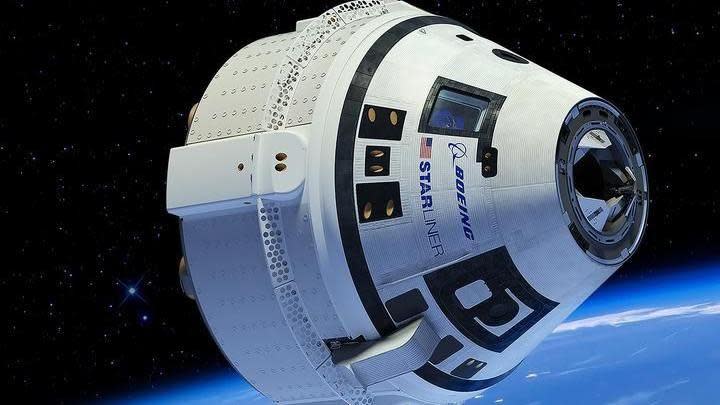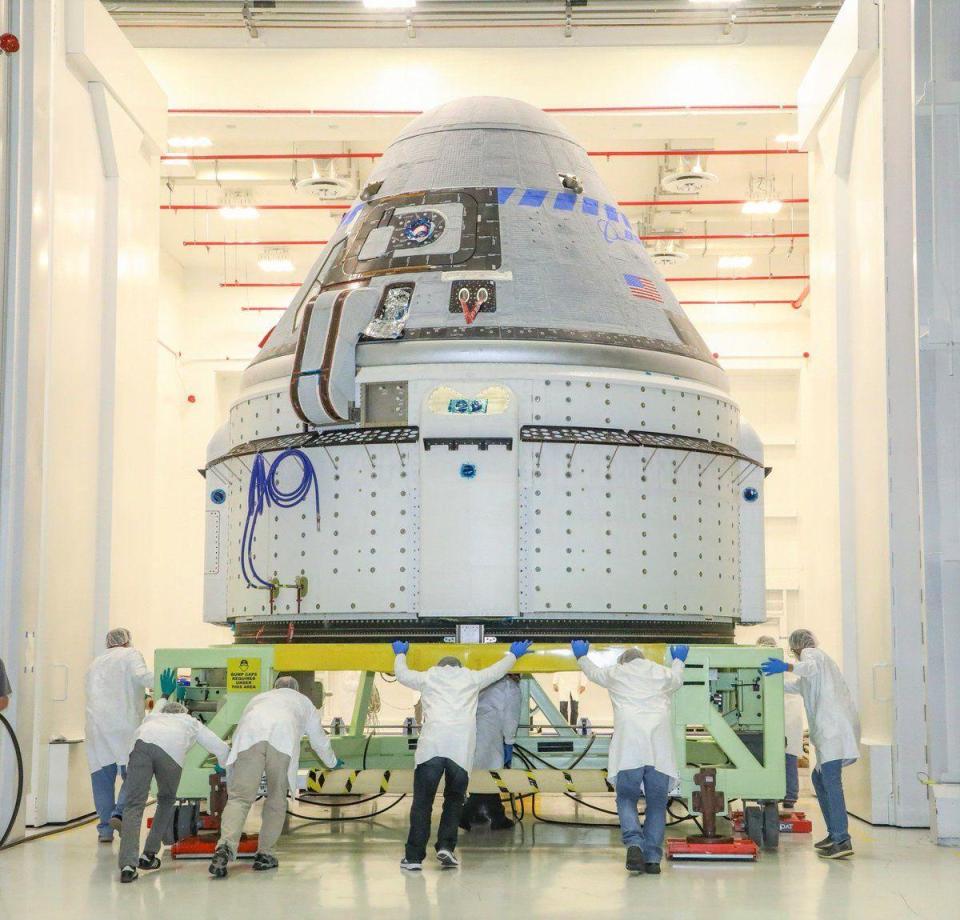Why are the Boeing Starliner astronauts still in space?

The two astronauts testing out Boeing’s new Starliner spacecraft were supposed to begin making their way back to Earth on Wednesday night but instead they will stay on the International Space Station (ISS).
The vessel's return to Earth had already been delayed because of issues with some of its thrusters and leaks of the helium gas which pushes fuel into the propulsion system.
Nasa is carrying out a high-level review of the technical problems before deciding when to bring its astronauts home.
Suni Williams and Butch Wilmore are in no danger, but what has gone wrong with the spacecraft and what does this mean for their journey home?
You may also be interested in
Starliner was launched on 5 June despite there being a small leak of helium gas. Helium is used to push propellent to the thruster systems used for maneuvering in space and slowing down to re-enter the Earth’s atmosphere.
The leak was extremely small and engineers believed that it would not affect the mission and so went ahead with the launch.
But four further helium leaks developed during the mission and five of its 28 maneuvering thrusters cut out during the approach to the space station, four of which were restarted.
The mission was supposed to have lasted eight days, but the return date was postponed as engineers investigated the issues.
Then on 18 June Nasa announced that Starliner would start its journey home at 22:00 EST on Wednesday 26 June (03:00 Thursday 27 June BST).
Nasa had earlier stated in a blog post stating that the leaks posed no safety risk to the astronauts because: “Only seven hours of free-flight time is needed to perform a normal end of mission, and Starliner currently has enough helium left in its tanks to support 70 hours of free flight activity following undocking.”
But just a few days later, following high-level meetings, Nasa concluded that the scheduled return should be "adjusted" to a date in July. No additional information was given as to why the decision had been changed.

Nasa stated that flight engineers wanted to study the spacecraft to get to the bottom of the faults before it re-entered into the Earth’s atmosphere. That's because while the crew capsule will parachute to the ground, Starliner’s faulty lower 'service module' will burn up upon re-entry, meaning the loss of some information on what went wrong.
The space agency stressed that the astronauts were not stranded and that Starliner was certified to return to Earth in the event of an emergency on the ISS.
What happens next is subject to a high-level “agency level review” by Nasa to decide what to do next.

The sequence of events raises questions about whether the launch should have gone ahead in spite of the leak.
Dr Adam Baker, who is head of Rocket Engineering, a UK company specialising in rocket propulsion systems, says he understands why the launch took place but says it would have been better to have got to the bottom of the cause of the leak and repaired it.
“There is a risk of trying to get things too perfect and ending up taking too long and it being too expensive and as a result, public and political support disappears," he said.
“But what I feel is that they may not have sufficiently considered the worsening of the leak after launch. This is something that Nasa and Boeing probably should have done.”
That would have been tremendously expensive, as it would have involved taking the rocket off the launch pad and taking the propulsion system out of the spacecraft.
Another issue for Nasa’s review is why these issues were not identified in any of the two previous uncrewed flight tests of Starliner, according to Dr Simeon Barber, who is a space scientist at the Open University.
“The problems we have seen in the last few weeks are not the kind we would have anticipated at this stage of the development programme for Starliner,” he says.
“The whole point about this was to test what putting astronauts in the loop of controlling the spacecraft would do in terms of performance. Instead, we seem to be dealing with rather more fundamental issues that really should have been ironed out by now.”

Finally, for Nasa, there is the critical issue of identifying the underlying cause of the helium leaks and thruster problems. Until they do that, all the analyses of the risks of a safe return of the astronauts and any contingency plans will be incomplete, according to Dr Barber.
“Unless the root cause is understood, they are having to make a judgement about the return based on incomplete information. If you don’t fully understand the cause of any failure then you can’t say for sure that you have not got a systematic problem that will affect not just the primary propulsion system, but also the back-ups.”
As a last resort, Nasa and Boeing can return their astronauts on SpaceX's Dragon capsule, which would be hugely embarrassing for Boeing. But we are not in that territory yet, according to Dr Baker.
“With new spacecraft you should expect the unexpected,” he says. “This is an entirely expected bump in the road and I don’t think it to be a major concern, other than it needs to be analysed and fixed before the next crewed flight.”


